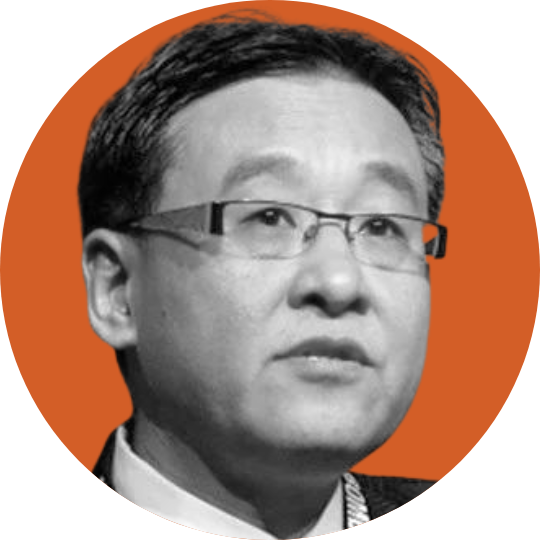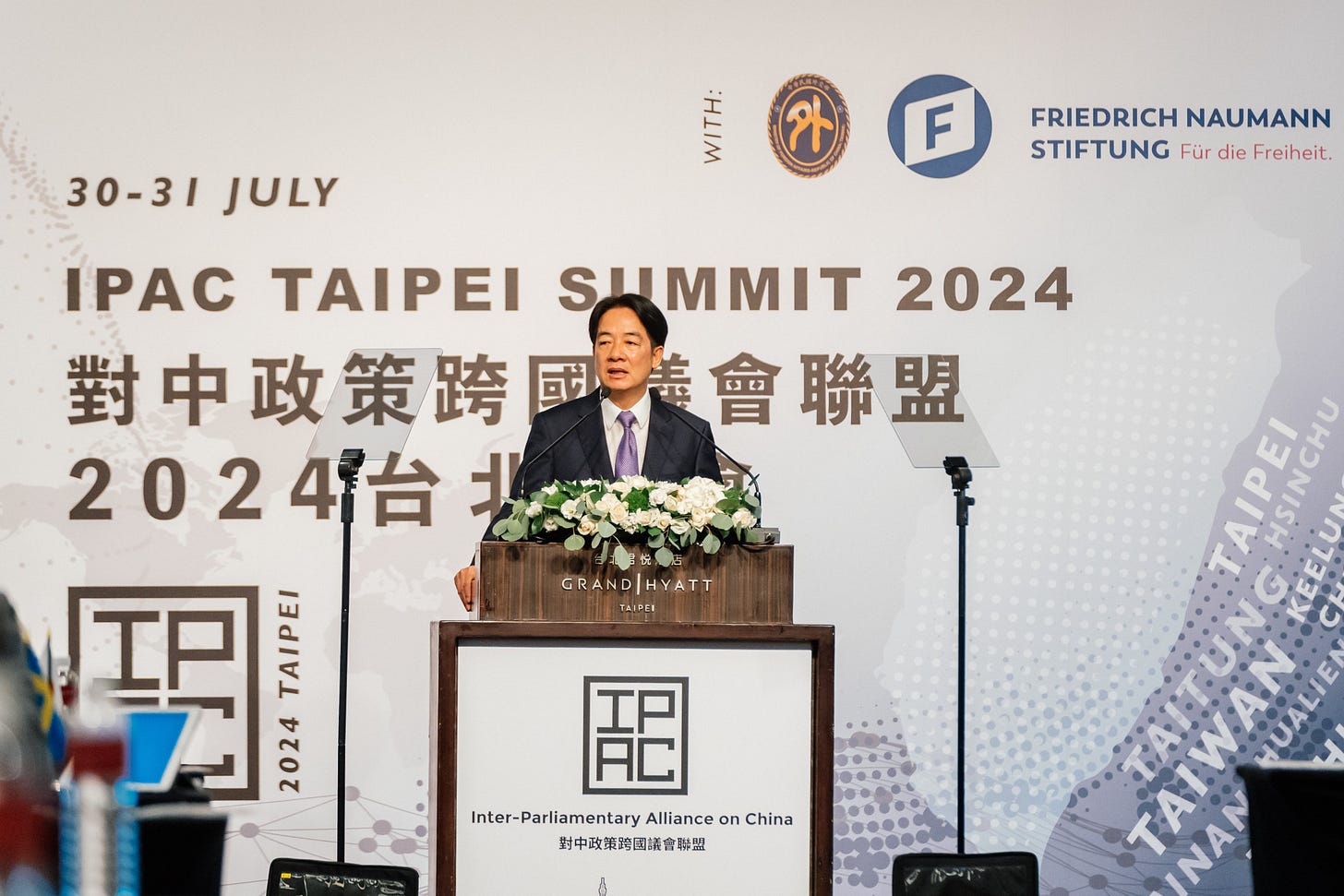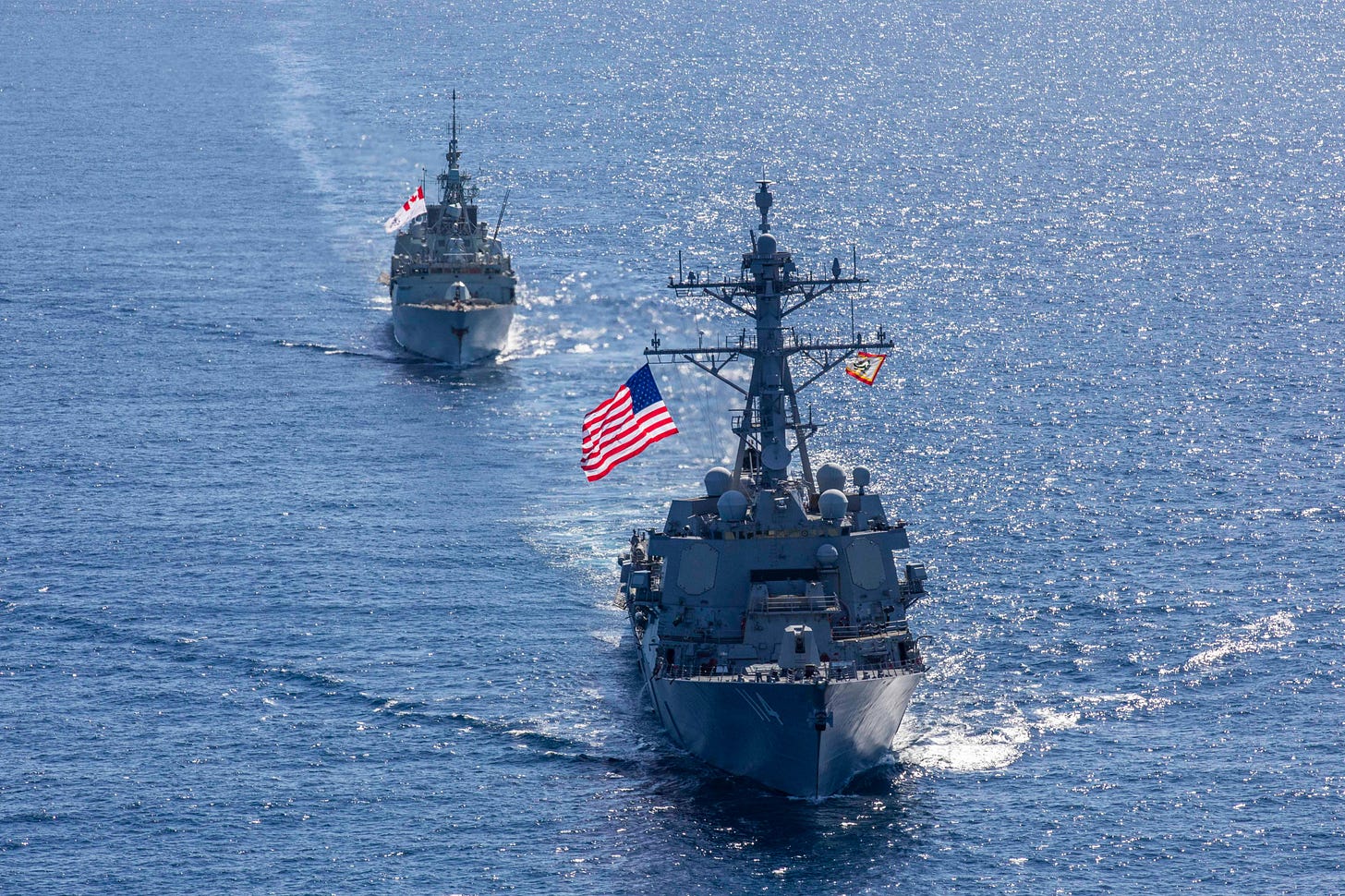Taiwan's Lai Addresses Canadian MPs, Navy Conducts Passage Through Strait
Canadian MPs were among those that converged in Taipei for Inter-Parliamentary Alliance on China summit, Canadian naval ship transits Taiwan Strait, and more.
This week's edition of IPD's Canada-China Brief covers Canadian MPs in Taiwan to attend an interparliamentary summit addressed by President Lai Ching-te and the Royal Canadian Navy’s recent transit of the Taiwan Strait to Beijing’s condemnation.
From Our Experts
On Canadian MPs attending an interparliamentary summit in Taiwan:
Parliamentary exchanges and visits have been conducted with Taiwan for many years, and are an important part of fostering understanding and dialogue. They are conducted by individual Members of Parliament, not by the Government of Canada. While respecting Canada's one-China policy, they add an important dimension of bilateral engagement and an opportunity to share views and discuss issues.
The Inter-Parliamentary Alliance on China is a relatively new addition to the network of Parliamentary dialogue. It has done useful work in drawing attention to human rights issues in China, but at this stage I think it is too early to assess its impact on how Canadian MPs interact with China and Taiwan.
– Hugh Stephens, Advisor, Institute for Peace & Diplomacy
On Chinese EV automaker BYD exploring expansion into the Canadian market:
It is obvious that China’s auto industry has been getting more and more competitive in recent years, with its EV sector emerging as the global leader in both quality and cost. While an open market approach in North America and Europe will benefit consumers greatly, the local industry in these regions will suffer due to their lack of competitiveness. So it is understandable that protectionism and the protection of local jobs will be the priority for governments in North America and EU countries over consumer interests.
BYD is the world’s leading EV manufacturer and its ambition is not limited to the Chinese market alone. It has already entered into many third world markets and is enjoying a surging share of EV sales globally. It is also eyeing advanced industrialized countries that have much stronger consumer power, even they all have an established auto industry. While it is facing an uphill battle in EU and the U.S., it may see Canada as a potential opening, thus the latest efforts as reported. But the difficulty is that Ottawa politicians will have to consider guarding its auto parts industry which is closely integrated with the US counterparts, and no political parties can risk being accused of favouring Chinese EV entry into Canada over local jobs. This will be particularly the case when a federal election is on the horizon next year.
– Wenran Jiang, Advisor, Institute for Peace & Diplomacy
Top Stories
Canadian MPs Join Parliamentary Summit in Taiwan Addressed by President Lai
In the largest delegation of international lawmakers to ever visit Taiwan, two Canadian MPs joined the annual summit of the Inter-Parliamentary Alliance on China (IPAC), this year held in Taipei. Independent and former Liberal Kevin Vuong as well as Bloc Québécois MP Yves Perron made up a group of 49 political figures across party distinctions from 24 countries.
New host, new member — IPAC noted that this year they put the Taiwan Strait at the “top of the agenda” as Taiwan itself was added to the group:
In its own words, IPAC stated that the intended deliverables from the summit were to agree upon “coordinated campaigns to be pursued [by attending legislators] in their respective parliaments upon their return home” to be informed by “high level contributions from the Taiwanese government.”
At the summit’s end, Taiwanese lawmakers Fan Yun of the ruling Democratic Progressive Party and Chen Gau-tzu of the Taiwan People’s Party were inducted into IPAC, which the organization said was in keeping with being “a strong advocate for Taiwan’s meaningful participation in international organisations.”
In a joint ‘Model Resolution on 2758’, lawmakers agreed they would “resolve to inform the public about the distortion of United Nations Resolution 2758,” the 1978 UN document that transferred China’s seat in the UN Security Council from Taipei to Beijing and recognized the latter as the only government of China.
The model resolution that MPs pledged to pass in their respective countries states that Resolution 2758 “does not address the political status of Taiwan; does not establish PRC sovereignty over Taiwan; [and] is silent both on the status of Taiwan in the United Nations, and on Taiwanese participation in UN agencies.”
It adds that “2758 does not establish the ‘One China Principle’ as a matter of international law," that "nothing in law prevents the participation of Taiwan in international organizations," and that "2758 has no bearing on the sovereign choices of other countries" and their relations with Taiwan.
‘Prevent war by preparing for war’ — President Lai addressed the summit by touching on Taiwan’s value to other democracies and its approach to Beijing:
Lai commended that IPAC members ”have each played a key role in promoting resolutions and bills in support of Taiwan” and warned that “history should serve as a mirror for introspection — not as an excuse for aggression. The United Nations General Assembly Resolution 2758… is a notable example of this.”
Lai said that Taiwan is focused on building up its national defence capabilities, improving economic security and likeminded cooperation on semiconductor supply chains, and joining trade pacts like the Comprehensive and Progressive Agreement for Trans-Pacific Partnership.
Adding that Taiwan would stand “side-by-side with other democratic countries to demonstrate the strength of deterrence,” he underscored that his government is seeking to “prevent war by preparing for war, and achieve our goal of peace through strength.”
On relations with Beijing, he stated that “we will neither yield nor provoke, and we will maintain the status quo. And we are willing, under the principles of parity and dignity, choosing dialogue over confrontation and exchange over containment, to engage in cooperation with China.”
The Canadian contingent — MPs in Taipei for the summit noted attention on Chinese foreign interference and further support for Taiwan:
MP Kevin Vuong revealed that during a briefing at the summit by Piero Tozzi, Staff Director of the U.S. Congressional-Executive Commission on China, Canada was “highlighted as a cautionary tale” of Chinese foreign interference.
Vuong separately stated that “it was both comforting and alarming to speak with other parliamentarians similarly targeted with disinformation campaigns, false allegations, and lawfare,” instances of which he has attributed to Beijing during his politically controversial election and removal from the Liberal Party in 2021.
Tseng Ho-jen, Representative of the Taipei Economic and Cultural Office in Canada, recently commented that “IPAC leaders and members have faced substantial pressure from the Chinese government, with many of its members subjected to sanctions by Beijing.”
Bloc MP Yves Perron, who also serves as a Vice-Chair of the Canada-China Legislative Association in the House of Commons, declared that “international presence and support are essential to preserving democracy. Taiwan can count on the Bloc Québécois for continued support.”
The two MPs’ participation in the IPAC summit comes two months after Liberal MP Judy Sgro, Chair of the Taiwan-Canada Parliamentary Friendship Group, led a delegation to attend the presidential inauguration of Lai Ching-te and meet with his predecessor Tsai Ing-wen.
Canadian Warship Transits Taiwan Strait, Spurring Chinese Criticism
Canadian Joint Operations Command announced that the HMCS Montreal conducted a passage of the Taiwan Strait last week. The move, which follows a series of other transits by Canadian warships of the Strait in recent years, drew criticism from Beijing.
‘Together with allies‘ — Conducted on July 31, the HMCS Montreal had just concluded participation in joint exercises with the U.S. Navy in the East China Sea:
Canada’s announcement labelled the operation a “routine transit through the Taiwan Strait” and that “together with our allies, Canada supports the rules-based international order by operating in accordance with international law. Our activities promote peace, resilience, and security in the Indo-Pacific.”
The Pentagon highlighted the preceding operations in the East China Sea with the USS Ralph Johnson as a demonstration of “a powerful partnership in maritime defense and cooperation” as the HMCS Montreal has been deployed as part of Operation Horizon to upgrade Canada’s presence in the region.
Beforehand, the Japanese Ministry of Defence had announced that the HMCS Montreal had concluded monitoring and surveillance operations against North Korean maritime sanctions evasion around Japanese waters, which took place from June to July.
The HMCS Montreal’s previous transit of the Strait in June 2023 in concert with the USS Chung-Hoon destroyer saw a close encounter with PLA Navy vessel Luyang, which then-Captain Paul Mountford of the Montreal deemed “unprofessional.”
Beijing reacts — Beijing responded to the operation negatively as it has with previous Canadian naval transits of the Strait:
Naval Senior Captain Li Xi, PLA Eastern Theatre Command spokesman, stated that China took measures to “track, monitor and deal with the Canadian frigate's transit in the whole course” and that Canada had “hyped up” the HMCS Montreal’s transit.
Li went on to say that “the act of the Canadian side disturbs the situation and undermines peace and stability across the Taiwan Strait. The troops of the PLA Eastern Theater Command will remain on high alert at all times and be ready to respond to all threats and provocations.”
Meanwhile, Taiwan’s Ministry of National Defence released a press release noting the passage of the HMCS Montreal, saying that “during the sailing, the military was in full control of air and sea, and the situation was normal.”
Commander Travis Bain of the HMCS Montreal later spoke of the transit, saying that “we followed all the rules and regulations… The conduct from the Chinese, the PLA, as well as other navies, was professional as we proceeded through, and we proceeded southbound towards our visit in Manila.”
South China Sea next — The HMCS Montreal is now docked in Manila as part of a ‘goodwill visit’ to the Philippines:
Canadian Ambassador to the Philippines David Hartman said the port visit indicated “a demonstrated commitment to the Philippines, we've pulled a ship off of our Atlantic fleet to deploy it here to the Pacific to ensure that we have that consistent, persistent presence here — that doesn't get much more real than that.”
He added that “we have to make sure that the international order, which sustains and underpins our ability to be able to engage on a global basis to trade with the world, continues to exist” and “the best way to do that, frankly, is to utilize the sea lanes, to utilize that territory, to be able to exercise all of those rights that we have all subscribed to.”
Hartman also touted a Visiting Forces Agreement under negotiation between the two countries that would allow Canadian forces to be stationed in the Philippines, saying “we're much more optimistic that we will be able to conclude far more quickly, and we really are hoping to advance in the coming months.”
“The reality is, we've already exchanged text drafts, frankly, what we would want to achieve and articulate or codify with the Philippines is very comparable to what any like-minded partner or ally would also. So we don't have to reinvent the wheel, if you will.”
What They’re Saying
Canada’s G7 allies and partners have all maintained high-level engagement with Beijing, including state visits and face-to-face meetings, despite recent challenges and negative public perceptions of China. World leaders recognize that China can’t be simply wished away, and its economic prowess and international influence will continue to expand in spite of mounting downward pressures… The visit by Joly opened the door to adjusting Canada’s previous engagement strategy, as the lack of engagement prior to the Beijing visit did little to influence China’s behaviour or advance Canada’s interests.
– Jia Wang, Senior Fellow & Senior Advisor, Asia Pacific Foundation of Canada
It’s my view that the die was cast on which way Canada would go [on Chinese electric vehicles] when we started to implement a dollar-for-dollar matching to the Inflation Reduction Act. By investing large amounts of Canadian dollars into trying to build a domestic EV supply chain here, we now have to protect that investment, and part of protecting that investment is making it difficult for competitors to enter our market, frankly.
– Meredith Lilly, Simon Reisman Chair in International Economic Policy, Carleton University
At the end of the day… government isn’t the primary driver of trade. The primary driver of trade is individual businesses making decisions based on a variety of factors; political risk may be one of them—but primary is profit, and market availability and market attractiveness… I don’t disagree with the general focus of the government in trying to have an Indo-Pacific strategy, and try to do more with South Asia, Southeast Asia, Eastern Asian with the exception of China, but you can’t ignore the primacy of the Chinese economy in the region.
– Gordon Houlden, Director Emeritus, China Institute, University of Alberta
If you enjoy our work, please consider contributing:
Image credit: IPAC | U.S. Pacific Fleet








